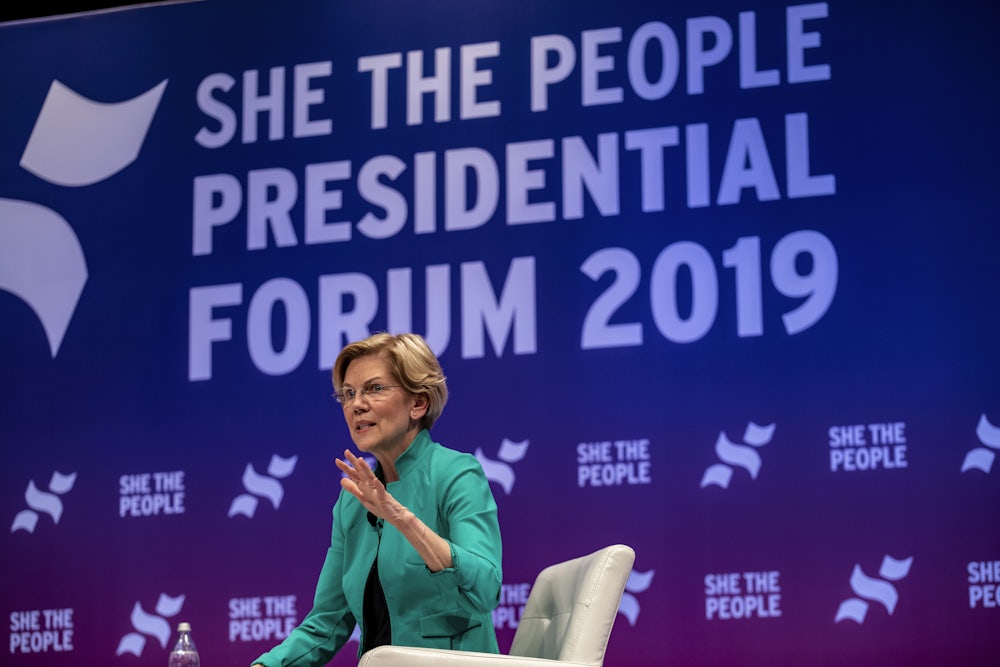If there were any doubts about the necessity of a presidential forum focused entirely on black women and women of color, She the People founder Aimee Allison put them to rest Wednesday in her opening remarks to the crowd at Houston’s Texas Southern University. “Remember,” she began, “we’re a powerful voting bloc. One of five voters in primaries are women of color, and we are 25 percent of the voters in key swing states: Texas, South Carolina, Georgia, Florida, [and] Arizona.” She went on to note that women of color are also the “strongest Democratic Party voters in Virginia, Pennsylvania, Ohio, Michigan, and California.”
But those of us who can still vividly recall the outcome of the 2016 general election shouldn’t be at all unfamiliar with those kinds of stats. Exit polls showed that black women threw near-unanimous support (to the tune of 94 percent) behind Hillary Clinton. Clinton also garnered 69 percent of the Latina vote.
Women of color are a powerful voting bloc—but considering yesterday’s She the People Presidential Forum 2019 was the first-ever presidential candidate forum focused exclusively on women of color, it’s also apparent that they haven’t been courted with as much targeted attention as their reliable turnout should command. That women of color deserved presidential hopefuls’ undivided attention was a reality Allison continued to drive home at the top of the event. “We want to insist that whoever receives our vote and our support will govern with our deepest values and full humanity in view.” She stressed that “the stakes could not be higher,” before making the bold assertion that the candidate who best demonstrated the ability to stand with women of color on issues of importance would win the 2020 Democratic nomination and the White House.
Over three hours, in front of an enthusiastic and highly vocal audience, eight of the 19 declared Democratic candidates made their cases, fielding questions from Allison, MSNBC’s Joy Reid, who served as forum moderator, and several pre-vetted attendees who appeared onstage to ask their own questions. The candidates appeared in alphabetical order from Senator Cory Booker to Senator Elizabeth Warren, with former Housing Secretary Julian Castro, Representative Tulsi Gabbard, Senator Kamala Harris, Senator Amy Klobuchar, former Representative Beto O’Rourke, and Senator Bernie Sanders in between.
Though each contender worked hard to woo the crowd, not all were successful. It was clear early on who had done their research and knew how to read the room; Harris was warmly welcomed and Warren received a standing ovation. It was just as clear who might continue to struggle with this constituency. Neither Gabbard, Klobuchar, nor Sanders connected with the audience as well as they should have.
Most often, the dividing line was the final question posed to each participant: Why should women of color choose you?
Unsurprisingly, two male candidates—Julian Castro and Cory Booker—cited female relatives as access points for issues relevant to women of color. Sanders sidestepped this question—as well as one about white supremacy—altogether, citing his involvement in the 1963 March on Washington and his support for Jesse Jackson’s 1984 and 1988 presidential campaigns as proof of his connection to communities of color and his commitment to fighting for “all people.” Of the male candidates, O’Rourke came across as most sincere, admitting that he had yet to earn the votes of women of color. The former El Paso Congressman added he would try to do so by listening to women in politics and activism, and to women voters on the campaign trail.
Though it was cringe-inducing to watch many of these candidates stumble over what should have been an easy and essential question, their shared awkwardness underscored just how unprepared politicians often are to engage the specific needs and expectations of black and brown women. And the forum made sure to highlight those expectations through the voices women representing a wide variety of experiences: Undocumented students, debt-saddled college graduates, Native women, black mothers concerned about disproportionately high maternal mortality rates, and queer women were all invited onstage. They posed questions about a broad range of issues, from sub-minimum wage for restaurant servers to abortion access, from criminal justice reform to immigration, and from low investigation rates for incidents of violence against Native women to the impact of redlining on generational black and brown homeownership.
Reid even acknowledged questions and comments called out from the crowd, posing them on behalf of women who didn’t make it onstage. And when candidates veered toward vague generalities, Allison and Reid would insist on more precise answers.
The message was clear: if you want our votes, earn them. And forums like these, where there’s no escaping the hot seat, are where candidates should start to pay—in intellectual rigor and in sweat. Black and brown women may have demonstrated a consistent willingness to vote blue in the end—whether or not the eventual nominee best represents our interest—but until then, while the Democratic nomination is still up for grabs, we can and should be as discriminating as we please. For their part, the candidates vying for our loyalty should be far more aware of our diversity—we’ve simply been waiting too long to be heard by Democratic contenders who otherwise regularly take our support for granted. The She the People forum was a reminder that for 2020, the candidate pool is simply too crowded for them to make that kind of careless mistake again.
